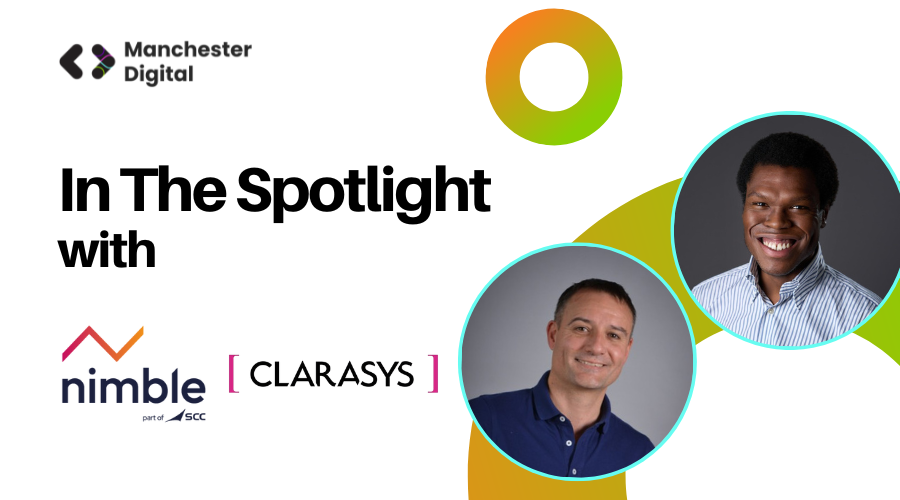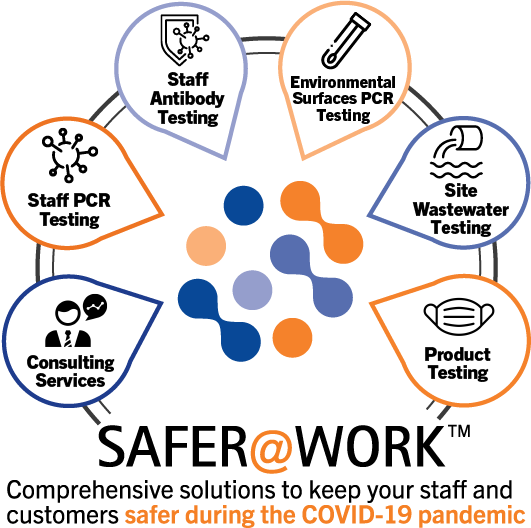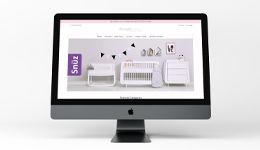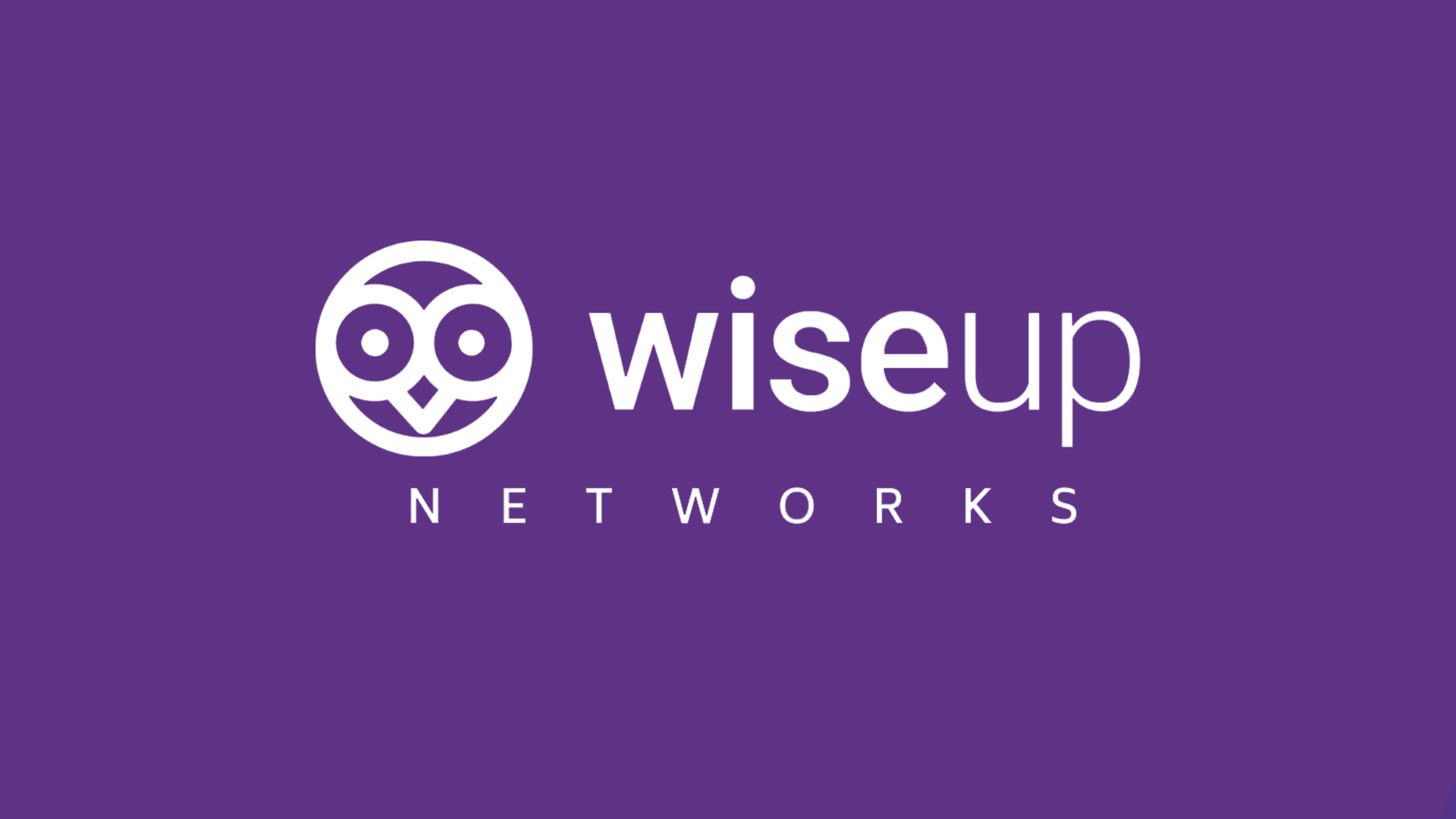
At Manchester Digital, we like to interview our members to find out a bit more about what they do and their work in the Greater Manchester digital and technology sphere. For a special edition this week, we're speaking with Andrew Pitkeathly, Head of Public Sector at Nimble Approach who is joined by Mark Dunwell, Associate Director at Clarasys. With the two businesses having recently partnered on a piece of public sector work, we caught up to discuss SME partnerships.
Click here to watch Kate Wilson, Head of Membership & Community at Manchester Digital, speak to Andrew and Mark about the partnership.
Can you begin by telling us a bit about yourselves and the work your organisations do?
Andrew: I'm Andrew, Head of Public Sector at Nimble Approach, responsible for nurturing our existing client relationships, ensuring the quality of our service delivery, and driving new business growth within the public sector.
Outside of work, my wife Zahra and our energetic 8-year-old son, Kamran, keep life very full.
Nimble Approach was founded in 2016 by Chris Roberts as an agile consultancy and has steadily grown since.
We now have offices located across the UK in Manchester, Leeds, Sheffield, and Bristol. Approximately half of our 125-strong team are billable consultants dedicated to the Public Sector, a group of individuals who are genuinely motivated by the opportunity to deliver impactful and beneficial services to the public.
Mark: I’m Mark and I’ve spent over 15 years working within the public sector - from higher education to health and local to central government. I’m passionate about creating excellent citizen-facing services and products that are accessible, inclusive, great value and people actually enjoy using.
I’ve been working at Clarasys - a team of nearly 200 people - for nearly 5 years now, leading our UK and US public sector and health teams. We describe ourselves as the Experience Consultancy as we’re dedicated to helping organisations create better experiences for customers, employees and the planet.
Outside of work, I’m enjoying rediscovering children’s stories with my 1 year old son, Max. When I’m not trying to keep up with him, I’m often experimenting with food, either blending fruits for a Caribbean punch or testing out obscure spice combinations with my wife Sarah.
What are the core values that shape your organisations?
Andrew: For me, a central value at Nimble Approach is our ability to make a tangible difference, both to the professional lives of our people and, crucially, to the public through the work we undertake.
We actively cultivate an egoless environment with a flat organisational structure, fostering a strong sense of family and belonging that we invest significant time and effort in maintaining.
We strive to empower everyone who joins us to make a real impact, both on their client projects and within Nimble itself – a key driver for many choosing an SME like ours.
Unlike large Technology Consultancies burdened by excessive process, we prioritise our people, ensuring their voices are heard and valued. Our agility and responsiveness are paramount; we can act decisively and quickly, a hallmark of being a Nimble SME, free from cumbersome governance, allowing our teams, to operate with clear guardrails and make fast, informed decisions.
Mark: For Clarasys, we try to break out of the consulting norms that most organisations adopt. We focus on trusting our people and letting them play to their strengths. My job is about helping to create and foster an environment that enables people to do that. So, what does that look like in practice?
Structurally we do a few things differently. We believe in a Team of Teams model which breaks out of traditional norms of hierarchy where everything needs to be led by a Partner/Director or every single decision needs to go to the most senior person to decide. We believe that the best decisions are made by those closest to the data and who understand its impacts, not based on seniority. So everyone is expected to act as an owner, one of our core values (which we take seriously as an employee-owned, purpose-driven business) and encouraged to make decisions. That means change can happen quickly.
To reinforce this, we place a big emphasis on learning and development, getting our people to reflect on how they have grown against their own career objectives regularly.
As SMEs, what’s unique about the way you work with clients to tackle their challenges?
Andrew: As an SME, Nimble offers unparalleled focus and dedication to our clients. With a select portfolio of around 10 to 15 key clients, each engagement is of significant importance, allowing us to deeply immerse ourselves in understanding and resolving their specific challenges. This commitment extends from the CEO down through the entire organisation.
Our people are deeply invested in their clients' success, treating client problems as their own. We actively encourage close collaboration, often inviting clients to our offices to experience our working culture firsthand, fostering a strong sense of partnership.
People who join Nimble are typically drawn to our SME nature and values, leading them to go above and beyond in supporting our Public Sector clients, often acting as coaches and upskilling client teams.
Our view is long-term, focused on building multi-year relationships and consistently doing what is right for the client, even if it means advising against unnecessary IT expenditure, as evidenced by our advice to a Blue Light service on process optimisation and a Central Government department on using existing resources instead of large-scale IT investment – a level of impartial advice our SME structure allows.
Mark: At Clarasys we treat your organisation like our own business. We know making change is hard and costly, both from a monetary perspective and when considering the amount of change within most organisations typically. So we invest in understanding your context and bringing the right knowledge to support your objectives.
For example, at Clarasys our people do a lot of pro-bono work within Justice, working with charities and organisations outside of government like Crimestoppers, Bounceback and StandOut. So that means whilst working with departments such as The Ministry of Justice or HM Prison & Probation Service, we can bring a more empathetic understanding of the service user experience, the stakeholder landscape and key lessons learned when partnering to deliver sustainable change within that operating environment.
Why do you think SME partnerships work for you?
Andrew: Public sector organisations benefit significantly from the diversity that two or more SME partners bring to the table, drawing on our varied backgrounds and experiences across different clients. This blend of viewpoints helps public sector organisations arrive at more well-rounded and effective solutions.
We often find a strong alignment in core values with other SMEs, particularly around social value, how we treat our staff, and our approach to client relationships. In our partnerships, we prioritise getting to know each other's organisations and working styles.
While there's a degree of competition, there's also genuine support, with SMEs frequently collaborating on bids and maintaining friendly professional relationships. Any issues that arise are tackled swiftly with direct communication, bypassing layers of management for rapid decision-making. Our partnerships often operate on a foundation of trust that transcends the formal contract.
Mark: Business-wise, partnerships are great for us as they allow us, as an SME, to be specialists in areas we excel in rather than spreading ourselves too thinly. The major benefit is that we’re still able to deliver the end-to-end vision and strategic objectives for clients alongside innovative and talented partners that we trust.
Tell us about some of the pitfalls and lessons learned along the way.
Andrew: A significant lesson for Nimble was the attempt to operate under a client's branding on projects. This proved ineffective, feeling inauthentic to our team and not resonating with the client.
We now present ourselves as Nimble Approach across all engagements. Moving forward, in any collaborative work, we would suggest all participating SMEs maintain their distinct identities.
Clear and proactive communication between SME partners before critical decisions are made is paramount. Without it, a disjointed approach can easily emerge, but this is solved with open communication channels – for instance, our instant communication via Slack with partners like Clarasys.
Mark: As with most things, you tend to learn the most when things go wrong. The same is also true of partnerships. The biggest lesson I’ve learned is knowing what you are looking for in a partner. It’s easy to focus on your own organisation and what you uniquely bring. However it's important to ensure the partner firm meshes well with our organisation, to not only deliver results for the clients, but make sure the process of doing so is a positive one.
At Clarasys we co-create shared values and partnership principles before starting work together. These often anchor around prioritising the client’s problem/interests above anything else or discussing how we will work together and tackle conflict together along the way.
Values are easy to have when things are going well. They are much harder to stick to when things are going wrong or costs come into play which is why agreeing partnership principles early help set you up for success.
How important is collaboration with other suppliers for your businesses?
Andrew: Collaboration with other like-minded SMEs is absolutely key for Nimble. Winning public sector work can be challenging, but by partnering, we can secure meaningful projects that offer growth opportunities for our staff and fulfil their desire to contribute to valuable public services.
Together, we can create ecosystems of diverse partners, offering comprehensive benefits to the public sector. My personal focus over the coming years will be on fostering more of these partnership opportunities, as I firmly believe they are a win-win for Nimble, our SME partners, and, most importantly, the public sector.
Mark: We believe it’s important to bring together the right insight wherever that is to help solve the problems that organisations face today. So alongside insights from our UK and US experts, we tend to sit in the centre of a partner ecosystem to collaborate with tried and tested suppliers who are innovators within their own industries.
We also firmly believe that some persistent challenges affecting organisations and society require a more holistic approach. So our people actively bring together stakeholders across the system to discuss systemic challenges like the Race to Net Zero and becoming a purpose-driven business with greater impact, in order to map out how to navigate these issues together. Working alongside think tanks, SMEs, service users and small to large organisations helps make sure you have the right insight in the room to be able to meaningfully transform services and make real system progress.
What makes your approach to partnering different?
Andrew: Our approach is built on a foundation of transparency and trust, with genuine relationships rather than purely transactional engagements. We prioritise open communication, rapid problem-solving due to our flat structures, and a shared commitment to delivering value to the public sector.
Our willingness to maintain our own identity while respecting and promoting our partners' individuality creates a collaborative environment where each SME's unique strengths are used. Furthermore, our long-term perspective and value-driven approach ensure that partnerships are built on mutual respect and a shared goal of achieving lasting positive impact.
Mark: Experience sits at the heart of everything we do. The focus on citizen, patient or staff outcomes means we’re constantly on the look out for organisations who are practitioner-led, passionate and bring innovative approaches to better understand these. And given our scale, we can establish key partnerships rapidly, test whether they work fast and bring this value to clients quickly. For example, from fast growing data solutions firms, leading health analytics companies, and global testing organisations, the focus is always on delivering the best value to our customers.
What do you see as the main issues and trends currently affecting the public sector?
Andrew: The public sector is currently navigating a period of incredible change. My strategic plans from just three months ago have already been significantly impacted. The increased investment in defence will likely have knock-on effects for central government departments. The announced reductions in civil service numbers present a challenge to delivery, but also an opportunity for SMEs like us to help create more efficient public services that reach a wider audience.
We are considering opportunities in the defence sector, while respecting the diverse views within our team. The potential impact of the "Trump Factor" and a possible recession loom large. On a more positive note, Keir Starmer's recent announcements around AI are encouraging, and we're already seeing AI-related questions in bids. The new security standard from DSIT is a welcome development, providing a clear framework for central government. Ultimately, the key is agility and the ability to adapt – something that SMEs like Nimble are well-positioned to do.
Mark: With the rate of global change evolving at an unprecedented pace - driven by tech disruption, shifting consumer demands, sustainability pressures and a rapidly changing political environment, there’s lots to keep track of.
Within the public sector on both sides of the Atlantic, we’ve seen a big push to review the size, shape and remit of government. For example, the Department of Government Efficiency’s drive for $1bn in spending cuts, NHS England being brought back under Department for Health Social Care and the UK’s commitment to 10% in year savings across non-protected Departments with up to 15% savings by the end of the parliament.
Looking forward, I expect policy areas that can proactively show how they create growth to support the UK’s Industrial Strategy (Invest 2035) will get funding above other priorities. Greater scrutiny on service outcomes and traceability on their positive impacts on citizens. And more appetite for a more radical re-imagining and re-designing of how government interacts with its citizens.
What are some of the obstacles faced by SMEs in today’s market?
Andrew: Building on the broader trends, SMEs face specific obstacles. Technology Consultancies are increasingly competing for smaller contracts due to a general market squeeze, requiring SMEs to be even more competitive. Their large bid teams are a resource that SMEs typically cannot match. This reinforces the importance of collaboration, allowing SMEs to pool resources and expertise to win work that might otherwise be out of reach.
Mark: As an SME we are constantly needing to demonstrate our value, as any business does. However, with more scrutiny on contractors/consultancies by the current government, which we are supportive of, this brings greater competition from larger businesses with larger budgets. So it’s even more critical that SMEs know what their differentiators are and are confident in communicating this.
Could you both give us one piece of advice for other SMEs looking to break into public sector work while staying true to their values?
Andrew: My single most important piece of advice is to stay true to who you are. The public sector genuinely values the unique qualities and perspectives that SMEs bring. Don't try to become something you're not. Your agility, your focus, and your values are your strengths in this market.
Mark: It can be easy to become a bit overwhelmed as an SME when looking to work with a new public sector organisation. My two pieces of advice (instead of just one) are centred around focusing on the things within your control.
Number one is around being confident and clear about how the skills you bring will help solve public sector problems right now, whilst still enabling organisations to achieve their longer term objectives.
The second is around being patient. It can take time to find the right stakeholders to speak to or the right-sized contracts to target. So setting aside time (more than you might think) to explore creative ways to hear what’s really going on within organisations that you want to work with, in their own words (i.e. at SME supplier events, via pre-market engagement, Q&As at conferences or meetups with speakers) can really help.
Thank you Andrew and Mark!
Find out more about Nimble Approach here.
Find out more about Clarasys here.
Watch our video interview with Andrew here.







